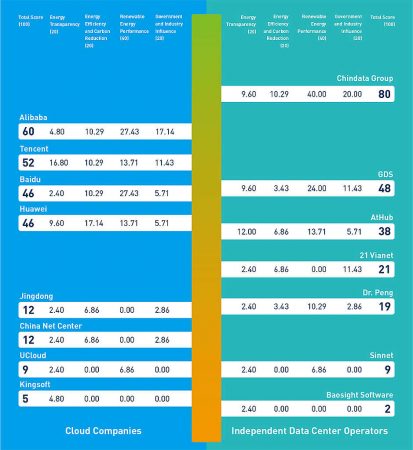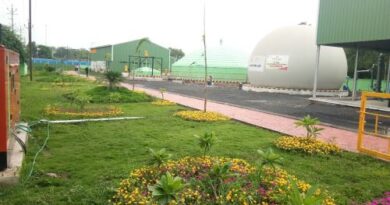China Tech Giants Trail Western Peers In Renewables Push
 Not Green enough
Not Green enough
In a first ever ranking of China’s tech giants, on their carbon footprint, Greenpeace East Asia and the North China Electric Power University have released their first-ever renewable energy ranking of China’s tech giants. Data center operator Chindata took the top spot, with a score of 80 out of 100. Alibaba received a score of 60, edging out Tencent, GDS and Baidu, which scored 52, 48 and 46, respectively. The low rankings of the top 4, when compared to their US peers, namely, Google, Facebook , Microsoft etc opens up an easy opportunity for the China based giants to catch up.
“In the face of global climate crisis, there’s an urgent need to clean up our internet. Power consumption from China’s internet industry is skyrocketing, and it’s imperative that Chinese internet giants lead the sector to break away from its reliance on coal. Many of China’s biggest tech companies have made some progress on renewable energy procurement in recent years, but they still lag behind their global peers. They must scale up their ambition and action,” said Greenpeace East Asia climate and energy campaigner Ye Ruiqi.
Key findings
- More than half of companies analyzed have begun to actively procure renewable energy on a limited scale. Alibaba, Chindata, GDS, and Baidu each operate one data center that is powered in significant part by wind and solar energy. Procurement mechanisms have expanded over the last three years and include rooftop solar, direct power purchase from markets and green power certificates.
- 80% of companies analyzed have not publicly disclosed electricity consumption or greenhouse gas emissions data. One noteworthy exception is Tencent, which has disclosed energy consumption data for data centers constructed over the last four years in mainland China.
- Chindata and Alibaba received the highest overall scores due to their progress on renewable energy procurement. Alibaba, GDS and Baidu fell short in the energy transparency category, as they do not disclose electricity consumption and greenhouse gas emission data. Tencent has made almost no progress on renewable energy procurement, despite leading on transparency.
- On Dec. 27 Chindata became the first China-based data center operator to set a target for 100% renewable energy use. It is the only company analyzed that has done so.

Pic Courtesy: Greenpeace
Power consumption from China’s internet industry is projected to increase by two thirds between 2019 and 2023. In 2018, China’s internet data centers were powered 73% by coal.
Researchers analyzed China’s 15 largest cloud companies and independent data center operators, encompassing 70% of the public cloud market and over 85% of the independent data center market. Companies were evaluated based on transparency, energy efficiency and carbon reduction, renewable energy performance, and government and industry influence.
“China’s leading tech companies, including Alibaba, Tencent, and GDS, must dramatically scale up clean energy procurement and disclose energy use data. Chindata just became the first China-based data center company to commit to 100% renewable energy, and we hope that more will soon follow,” said Ye.
The Chinese performance is in sharp contrast to the US and even Europe, where leading firms in the IT and digital space have been at the vanguard of the push for sourcing renewable energy. While Facebook, Google and Microsoft have all reached, or targeted to reach 100% sourcing this year, Google has even gone beyond and invested in a 55oo MW strong renewables portfolio, to help other businesses shift to green energy.
India, with its strong tech giants like Infosys, HCL technologies, TCS and now, even product firms like ZOHO has also seen a solid effort by these firms to go green, with Infosys leading the way. The launch of the India Climate Collaborative yesterday should further help in this move we imagine.




